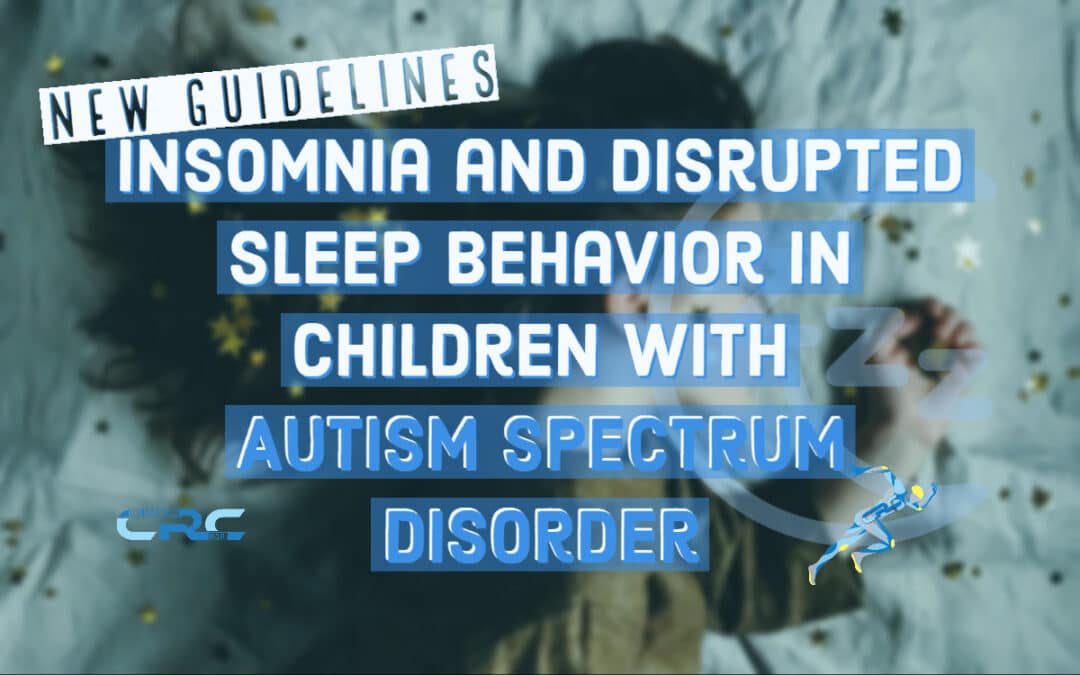Practice guideline: Treatment for insomnia and disrupted sleep behavior in children and adolescents with autism spectrum disorder.
CRC provides a review of the updated treatment guidelines for sleep disorders in children with autism.
Before recommending treatment clinicians should assess for medications and coexisting medical and psychiatric conditions that could contribute to the sleep disturbance and should address identified issues.
Potential medications that may interfere with sleep include ADHD medications (stimulants – Adderall, Ritalin), asthma treatments (corticosteroids), cold/flu medicines with alcohol/antihistamines, hormone therapy (thyroid hormones), and headache medicines with caffeine.
Specific medical and psychiatric conditions can cause insomnia and should be evaluated and treated appropriately. Uncontrolled nighttime asthma, a stuffy nose from allergies or itchy skin from eczema can get in the way of good sleep. Sleep disorders such as obstructive sleep apnea (associated with snoring) and restless legs syndrome may interfere with a child’s sleep patterns. Furthermore, psychiatric conditions like depression or bipolar disorder can be associated with poor sleep.
1st line Treatment: Clinicians should counsel parents regarding strategies for improved sleep habits with behavioral strategies as a first-line treatment approach for sleep disturbance either alone or in combination with pharmacologic or nutraceutical approaches. The Autism Speaks – Autism Treatment Network has detailed handouts on specific strategies to assist with helping autistic children with difficulty falling and staying asleep: (PDF: Children, Teens).
2nd line Treatment: Clinicians should offer melatonin if behavioral strategies have not been helpful and contributing coexisting conditions and use of concomitant medications have been addressed, starting with a low dose. Clinicians should recommend using pharmaceutical-grade melatonin if available. Clinicians should counsel children, adolescents, and parents regarding potential adverse effects of melatonin use and the lack of long-term safety data. The common dosage of melatonin ranges from 1–10 mg per day, but make sure to follow the instructions on the label. Parents should not give it to their children without first consulting their medical provider. Melatonin supplements are considered safe, and no studies have revealed any serious side effects to date. Yet, more research is needed to evaluate its long-term effects.
Additional Information: Clinicians should counsel that there is currently no evidence to support the routine use of weighted blankets or specialized mattress technology for improving disrupted sleep. If asked about weighted blankets, clinicians should counsel that the trial reported no serious adverse events with blanket use. Therefore, using weighted blankets may be a reasonable nonpharmacologic approach for treatment of insomnia and disrupted sleep behaviors.
Downloads: Strategies to Improve Sleep in Children with Autism Spectrum Disorders – A Parents Guide (From Autism Speaks) , Strategies to Improve Sleep in Teens with Autism Spectrum Disorders – A Parents Guide (From Autism Speaks), Quick Tips – Improving Sleep for Children with Autism
Practice guideline: Treatment for insomnia and disrupted sleep behavior in children and adolescents with autism spectrum disorder. Ashura Williams Buckley, Deborah Hirtz, Maryam Oskoui, Melissa J. Armstrong, Anshu Batra, Carolyn Bridgemohan, Daniel Coury, Geraldine Dawson, Diane Donley, Robert L. Findling, Thomas Gaughan, David Gloss, Gary Gronseth, Riley Kessler, Shannon Merillat, David Michelson, Judith Owens, Tamara Pringsheim, Linmarie Sikich, Aubyn Stahmer, Audrey Thurm, Roberto Tuchman, Zachary Warren, Amy Wetherby, Max Wiznitzer, Stephen Ashwal Neurology Feb 2020, 10.1212/WNL.0000000000009033; DOI: 10.1212/WNL.0000000000009033
Book online securely or call (941) 500-9292

Recent Comments